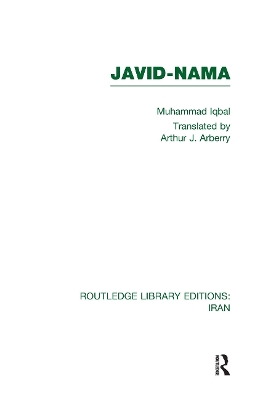Routledge Library Editions: Iran
1 total work
Sir Muhammad Iqbal (1873-1938) was not only amongst the leading political figures of his time, but regarded by many as the spiritual father of Pakistan and a great champion of the reform movement of modern Islam. He was also a poet, in both Urdu and Persian.
The recurrent theme of his poems is the infinite potentiality of man, as partner with God in shaping the destiny of the universe. As an ardent Muslim, Iqbal saw the realization of mankind’s future in a union of Islamic peoples, unfettered by the bonds of separate nationhood, fully liberated from the chains of imperial domination.
The Javid-nama, commonly acknowledged as his greatest work, develops this theme within the frame-work of the ‘Ascension’ story. In imitation of the Prophet of Islam, the poet soars through the spheres, encountering on his heavenly journey many great figures of history with whom he converses. The resemblance to Dante’s Divine Comedy is obvious.
